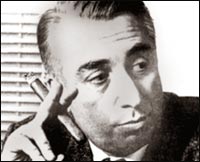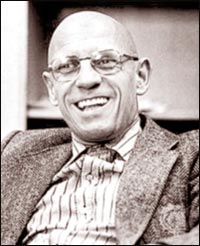Understanding Post-Modernism
 We
learn from books in English what modernism and post modernism are as
understood in the West. But how does a Lankan Thamilian Marxist-oriented
academic interprets Post-Modernism prompted a book written by him in
Thamil. The writer is Professor Emeritus Saba Jeyarasa. The book is
dedicated to young readers in the periphery. We
learn from books in English what modernism and post modernism are as
understood in the West. But how does a Lankan Thamilian Marxist-oriented
academic interprets Post-Modernism prompted a book written by him in
Thamil. The writer is Professor Emeritus Saba Jeyarasa. The book is
dedicated to young readers in the periphery.
This 96 page book was published in 2007 by Lanka Progressive Arts and
Literature Assembly and Kailasapathy Study Circle. It has 21 chapters
and a bibliography in English.
The titles of the chapters will indicate how the writer arranges his
thought process and marshals his thesis. They are:
|

Roland Barthes |
|

Michel Foucalt |
The origin growth and the stagnancy of postmodernism, its history,
its concept, a ‘Relook’, forces in the background, understanding
Derrida, the pioneering interpretation of Ibab Hassan, postmodernism
from the architectural angle, the stand taken by Jean Francois Lyotard,
Roland Barthes’s Death of the Author, Michel Foucault knowledge
methodology, Foucault’s feminism and postmodernism, post modernistic
aestheticism, post modernistic pedagogues, influence of postmodernism in
worldwide educational pragmatic methodology, post modernism and
theology, Bharatha Naatiyam and postmodernism.
New Historicism in the world of literature, the emergence of excluded
pluralism, a revaluation of postmodernism and postmodernism and Marxism-
this is quite impressive in the context of lack of understanding on the
subject by many in the Thamil and Muslim communities.
At present there are only a handful of English-knowing academics in
our universities. Saba Jeyarasa was Professor in education at the
University of Yaalpaanam.
He was also the Dean at the Ramanathan Fine Arts College which is in
the northern capital.
Author of many books of value in Thamil, Jeyarasa is one of the few
who is familiar with western philosophy, psychology, anthropology and
education.
He is also a pointed speaker in the sense he talk to the point
explaining his knowledge and views to the uninitiated. Here are some
gleanings from some of his articles: Let’s take his article on the high
art of dancing among the rich and the elite among the Thamilians and
Sinhalas- Bharatha (not Bhaaratha as mispronounced by some among the
Sinhala community) Naatiyam to quote his views.
The ‘pure dance’ application to this dance form in fact had its
origin in what was known as “Veriyaattu”
The Sanskrit dominant monarchy brought under its control education
that structured the Sanskrit concepts....The modernism and postmodernism
that spearheaded the Thamil cinema brought in several changes in the
structure of Bharatha Natiyam too. What Jeyarasa has written on
Postmodernism and Marxism may interest fully fledged Marxists in Lanka.
But unfortunately the style of writing of Prof. Saba Jeyarasa is so
unconventional that it he has his own coinages of term to explain the
corresponding terms in English terms which I found difficult to connect.
Nevertheless his attempt to explain what is meant by post modernism
is welcome particularly when Thamil only educated youngsters strive to
know what’s happening outside the northern peninsula and in the eastern
region, as well as the Colombo and Hill Country areas.
[email protected] |



